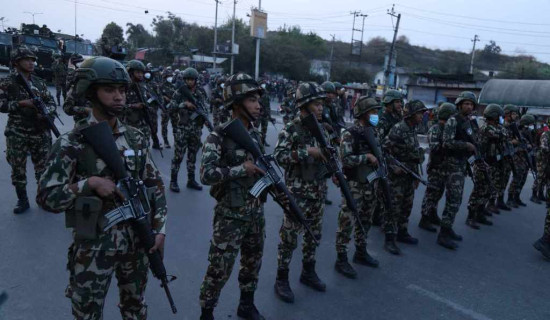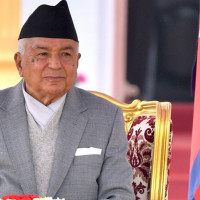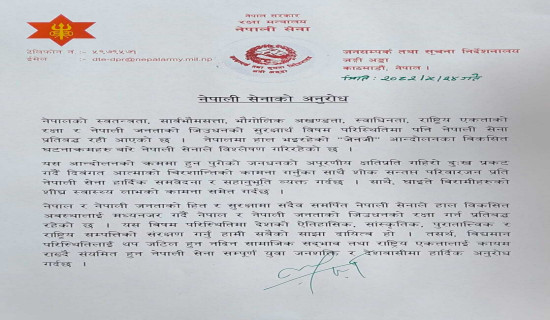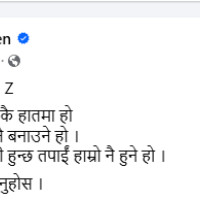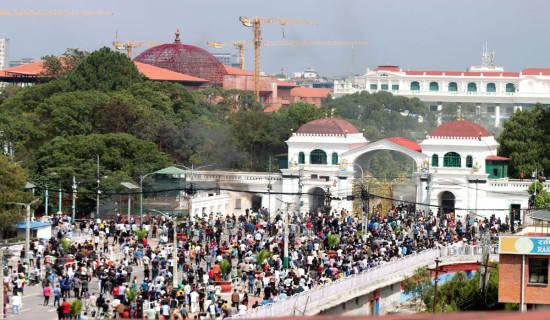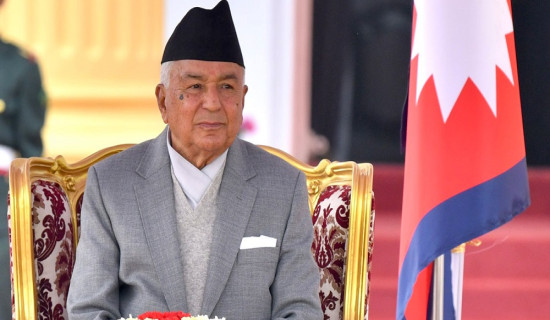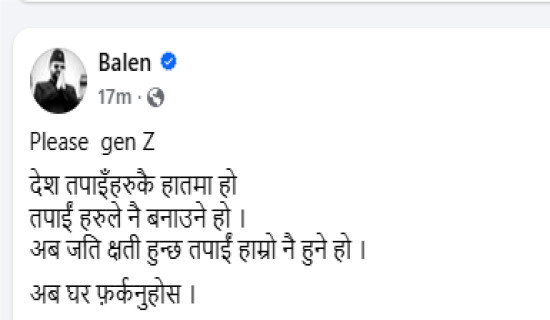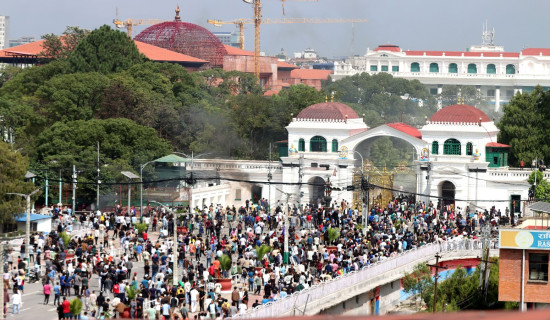- Wednesday, 10 September 2025
Perilous sky of the middle east
Shradha Arjyal Joshi

As it is said, “The sky is the limit”, in the 21st century, countries no longer need frontiers to declare war which is proved by the war between Israel and Iran when the former launched airstrikes on 13th June 2025 to ravage the latter. The imperial rivalry of powerful countries in the Middle East arose from the 19th century which led to various wars. Its geographical location at the very crossroads of continents has led this region to go through battleground for power struggle, and regime change with differences in religious and political ideologies.
More specifically over the last century, the region has shared the commonality of either British or French colonialism stemming from perennial conflict. The Middle East then witnessed postcolonial development, the rise of American hegemony, and now their gradual shift towards China and Russia for political and economic progression. Various revolutions and the failed democracy in establishing themselves further created a vacuum whereby extremist organizations and regional and international powers took the leverage.
The most controversial and debated matter in the Middle East today dates from 1948 when the state of Israel was formed which was eventually backed by America in order to establish its presence in the region. The decision did not garner any support from the Arab countries. Despite being a small country, Israel has been able to establish a strong foothold in the region. The Arab-Israel conflict that started disputes over land has led to decades of bloody war leading to displacement and loss of lives of millions. The regional instability heightened in Israel resulting in the war with Palestine and then Iran.
Perhaps the Middle East is reeling into the worst and, is at the pinnacle of broad regional war. On 13th June, Israel declared direct war on Iran and launched a determined bombing attack targeting Iran’s nuclear infrastructure, and in the words of Israeli Prime Minister Benjamin Netanyahu, “Degrade, Destroy and Remove Threats” of prospective Iranian nuclear weapons. Netanyahu has always characterized Iran as an existential threat and now Israel is on the war against Iran, broadly against the regime of Ruhollah Khomeini, the supreme leader of Iran. In response, Iran retaliated by launching a barrage of ballistic missiles and withdrew from proposed nuclear talks initiated by the US.
Israel has come up with a very cautious timeline since October, starting from Gaza, weakening Hamas, and further bombing Lebanon and Yemen to counter Hezbollah and Houthi militia which were backed by Iran.
ARAB in the salvo
Whether direct or indirect, Iran and Israel have both been in conflict for decades, and opposition to Israel is all that has defined the Middle East. The removal of the Jewish state from “Islamic lands” is the essence of the 1979 Islamic Revolution doctrine, which places Iran in the unlikely role of leader of the Muslim world. However, the definition of a leader in this region has changed with the power (economic, military) each country has been gaining over time. To its neighboring countries, Iran’s ambitious nuclear program, supporting the proxy militias in Yemen, Lebanon, Iraq, and the Assad regime has always molded crisis and threat. Every other nation in this region has adjusted with Israel with time, due to the US-backed military. On the contrary, Iran has been different. It portrayed Israel as the unifying opponent in its ambition to lead of religiously dominated Middle East. The war seems lopsided in favor of Israel due to the tech-savvy industry, capable of launching cyber-attack to great effect.
In recent times, the Gulf nations have openly criticized Israel’s violent war in Gaza-Palestine, refusal to engage itself in postwar peace or security, and aggression with brutal war actions. Israel’s military success in destabilizing the leadership of Hamas and Hezbollah has been secretly lauded in Gulf security circles; however, the Arab nations are facing global criticism over Israel’s war on Gaza and continued strikes on Syria ever after the Assad regime. These very reasons have made to perceive peace as a mirage in the region. The regional players hold very important and unique positions, and integrity and seek to influence to prevent the spiral threat posed by Iran, Israel, and America. Regional states now need to start for diplomatic process with trusted intelligence and channels to facilitate indirect conversations between Israeli and Iranian representatives, in the nick of time to save human lives.
SKEPTICAL FUTURE AHEAD
America’s involvement in war isn’t new as it has fought wars in Korea, Vietnam, the Gulf, Afghanistan, and Iraq, as well as conducted attacks and interventions in several other nations, including Serbia, Libya, Somalia, and Yemen. Once again, the United States is on the verge of having direct engagement in a perilous Middle East crisis. Israel counts on the United States as its close ally. The US-Israel security cooperation has been prevalent since the height of the Cold War from mid mid-1940s to the early 1990s, Israel maintains a check and balance towards political and extremist movements in the Middle East. These two nations also share information on terrorism, nuclear proliferation, and Middle East politics. The two nations have been indulged in collaborating to produce advanced military technologies.
Israel has openly urged the United States to join the war. After 12 days of air strikes between Iran and Israel, the United States directly intervened on June 21, in the conflict, attacking the three Iranian nuclear sites in Fordow, Natanz and Isfahan with bunker-buster bombs. President Donald Trump is the first American president to get into war with another country's nuclear program and the first to expressly support Israel in an attack on a foe. Iran reacted on June 23 with a missile assault on the United States.During an address to a meeting of the Organization of Islamic Cooperation (OIC) in Istanbul on Sunday, Iran’s Foreign Minister Abbas Araghchi said the US crossed “a very big red line” by attacking Iran’s three nuclear facilities. “It is an outrageous, grave and unprecedented violation of the fundamental principles of the Charter of the United Nations and international law,” he said, adding that the “warmongering and lawless” US administration will be “solely and fully responsible for the dangerous consequences and far-reaching implications of its act of aggression”. On Monday, several hours before striking, Iran had sent advance notice that a strike was looming. Qatar then had closed its airspace. In a televised speech, a spokesman for Iran’s Armed Forces said the attacks on the American base in Qatar had been carried out by the Revolutionary Guards Corps.
In a very dynamic and fragile situation, US President Donald Trump announced a complete and total ceasefire between Iran and Israel. Although it has halted, the conflict between Israel and Iran has not finished. The weakly agreed-upon truce between Israel and Iran might be shredded at any time. The conflict has ended, but not in true scenario. Ayatollah Ali Khamenei, the supreme leader, has come out of his bunker to take-off another war and this time against his people, after being shaken by rumors of regime change and Israel's murder of important allies. A security crackdown has resulted in hundreds of arrests. Spies have allegedly been put to death. It is suspending cooperation with International Atomic Energy Agency inspectors.
Prime minister Netanyahu has warned of the serious threat presented by the Islamic Republic throughout the majority of his forty years in public life, almost half of which has been spent as premier. He is at recent attempting to capitalize on the fact that Israel has allegedly destroyed Iran’s nuclear program. Now, watchers both within and outside of Israel are wondering what Netanyahu will do next. Pollsters and pundits are speculating that he could even try to take advantage of the news frenzy and call early elections. Iran's nuclear aspirations were, at least temporarily, dashed by the Israeli and American strikes. However, it is obvious that this is not the conclusion of the narrative. After using force, the United States needs to be determined to ensure that the risks it took are matched by a pledge to prevent Iran from obtaining a nuclear weapon. History needs to reach to a destination but not on false trails. Force definitely brings counterforce into war. Regarding Iran's nuclear program, the world is about to enter an extremely hazardous and unknown era, regardless of what happens next, a skeptical future ahead.



